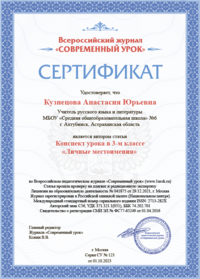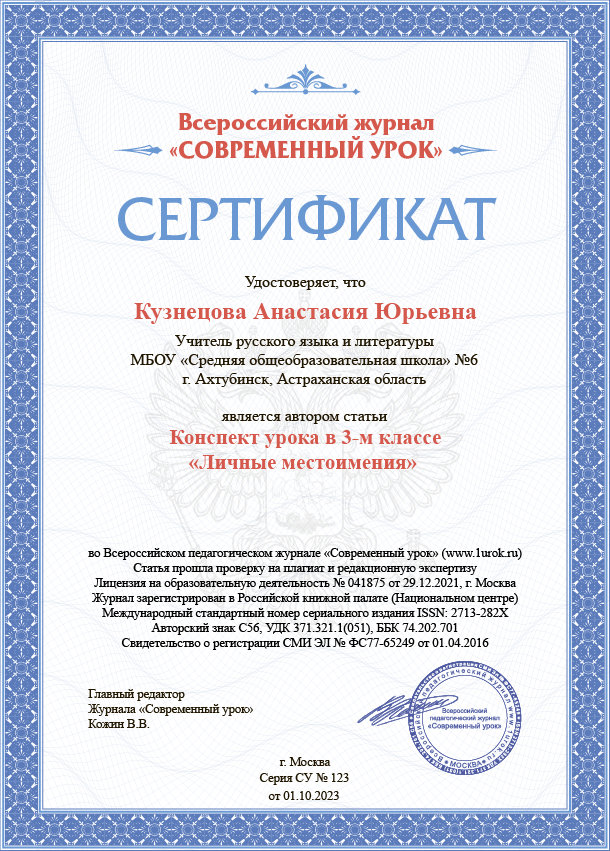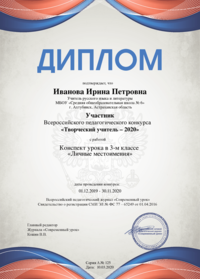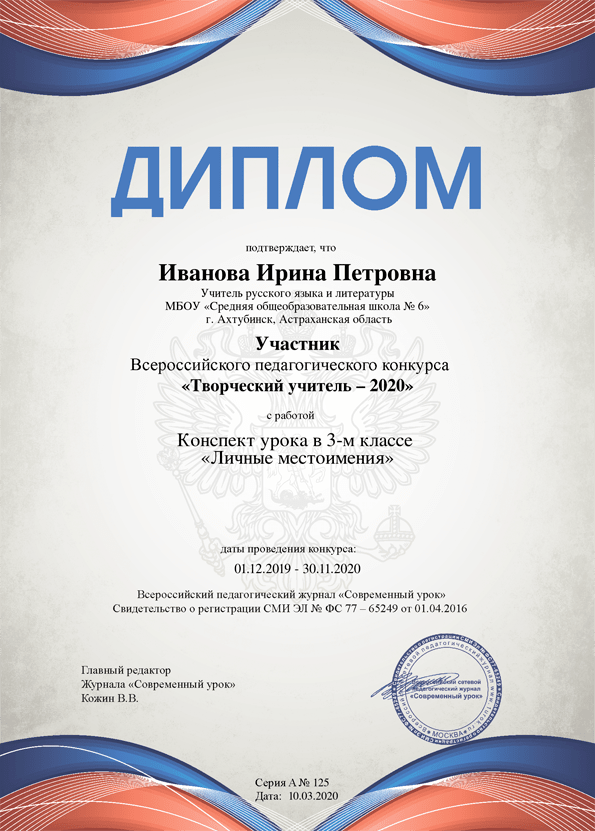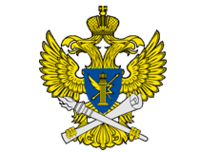Онлайн-урок-лекция ''COVID-19. Let's talk...''
Автор: Людмила Леонидовна Смирнова
Организация: МОУ Малеевская СОШ
Населенный пункт: Московская область, г.о. Клин
Цель урока: Введение нового лексического материала и развитие коммуникативной компетенции учащихся по теме «COVID-19. Let’s talk».
Планируемые результаты урока:
- умение оперировать в процессе общения новой активной лексикой;
- умение воспринимать информацию на слух с опорой на жесты и информацию, представленную на слайдах;
- умение воспринимать новые лексические единицы на слух с опорой на их объяснение на английском языке;
- умение применять знания в монологической и диалогической речи;
- формирование потребности в практическом использовании знаний английского языка и мотивации к дальнейшему овладению иностранным языком.
Covid-19: Let’s talk…
- Introduction.
Today we are going to talk about coronavirus in English. I hope you and your family are save and well. This is difficult challenge in time for all of us and we have a lot of information about coronavirus, so much information, so fast that it can makes us feel confused, worried and scoured sometimes. Right?
There are also I`ll give you a lot of new vocabulary about coronavirus and old different ways. So, I want to help you understand this vocabulary in English that you can talk about it to other peoples, to your classmates, to your friends or to your medical stuff if you need it. If your relatives or friends are in an English-speaking country, you can easily talk to them about the coronavirus or even help them. And finally, you can just improve your English you will have the opportunity to understand more words in the discussion of this problem.
So, this lesson can be different from your usual lessons but I’ll try to give you the most necessary information about coronavirus. First of all, just of you points, as you know, I’m an English teacher, I’m not a doctor. I`m teaching English, I’m not giving you any medical advices. Secondly, when it comes to your health it so important that you know as much information as possible and understand it.
This lesson I hope will give you many new words and expressions about coronavirus.
II. COVID-19. Let`s get start and primarily let`s start with the name of this illness. Officially known, it`s called COVID-19. That comes from the words Corona Virus Disease 2019. All right? That’s good. How do we say that somebody has this virus? We can do it in different ways. You could say:
e.g. He has COVID-19.
Or you can make negative:
e.g. He doesn’t have COVID-19.
Another way is just to say:
e.g. He has coronavirus.
Or negative:
e.g. He doesn’t have coronavirus.
One more example:
e.g. She has the coronavirus.
Or negative:
e.g. She doesn’t have the coronavirus.
All ways are used. We can used different terms for this illness. They say: COVID-19, coronavirus, the coronavirus, the new coronavirus, the novel coronavirus. Novel just means new. Let`s go on.
You might hear different expressions for this illness itself.
e.g. They tested positive for the coronavirus.
e.g. They tested negative for COVID-19.
If somebody tested positive it means they have the virus and if they tested negative they don`t have the virus. Is it understand? All right.
III. Symptoms.
We are moving on.
- What does the word Symptoms mean? - It means that you showing some kind of physical mental signs of this illness.
- And what are some symptoms of the coronavirus?
First one is a cough. What is a cough? Something like this «kh-kh». Right?
You know that. Good. And of course, if you need cough you must cough into the elbow. This advice from the medical stuff. (This is your elbow. You should cough in here.)
How do we use it in sentence?
e.g. He has a cough.
Another symptom is a cold.
What is a cold? You know, when your nose is running you say:
e.g. I have a cold.
Is it understand? Ok. That’s very good.
The next symptom is sneezing.
- What is sneezing? What does it mean? I`ll try to show you. It means like this «chikh-chikh», you must sneezing in the elbow too.
e.g. He is sneezing.
One more symptom is a fever.
- What is it? What does it mean to have a fever?
It means you feeling warm, hot. So, how do we say it in sentence?
e.g. She has a fever.
- How do you think, what other words connected with having a fever?
Temperature, to have a temperature.
So, you could also say:
e.g. He has a temperature.
Temperature is the heat in your body. If you tell somebody that someone has a fever probably the next question will be: What is her temperature?
And answer will be:
e.g. His temperature is 39 degrees.
The next symptom is body ache. What does it mean to ache? It means: to hurt – причинять боль.
e.g. It`s hard to think. My body aches and my body feels fatigue. Fatigue just means very-very tired – усталость. And the way we can used it in sentence:
e.g. His arms ached with fatigue.
The last symptom is difficulty breathing. What does it mean to breathe? In Russian it means: дышать.
e.g. It`s hard for me to breathe.
Is it understand? OK. That`s all with symptoms.
IV. Nouns.
And now let`s look at some more advanced words and some more advanced nouns that can be used about this subject. I propose you look at three advanced words that can be used most of all: outbreak, epidemic and pandemic.
What do these words mean?
- outbreak - it`s like this (* - начало, возникает неожиданно в одном месте, городе – «вспышка»)
- epidemic - it`s like this (** - чуть больше, возникает в нескольких местах, во многих городах, «эпидемия»)
- pandemic - it`s like that (*** - очень много, распространение почти во всех регионах, большое, огромное количество людей, «пандемия»)
An outbreak is when something happen suddenly, so a lot of people are affected.
e.g. There was an outbreak in Wuhan, China.
Next, when the outbreak spread to more people or other areas it became an epidemic.
e.g. When the outbreak spread. It became an epidemic.
Then the WHO declared COVID-19 a pandemic, where the WHO is World Health Organization. They said that this disease has become a pandemic.
e.g. The WHO declared COVID-19 a pandemic.
So, that means that epidemic spread even large areas, may all over the world and became a pandemic. Is it understand? OK.
Another word that you may hear a lot is measures – меры.
e.g. The Health Authorities took various measures.
To deal with this situation we need restrictive measures. Restrictive measures are actions or steps aimed at controlling this problem.
One more word is transmission – перемещение.
e.g. They wanted to limit the transmission of the virus.
So, the transmission just means spread of the virus, the passing on of the virus to other people, to more people. OK. It`s transmission, lets continue.
The next word is isolation – изоляция.
A lot of people should be on isolation it they have the virus. So, isolation means that somebody must be alone, not in contact with the environment and not in contact with other people for any reasons.
e.g. People who have the coronavirus must be in isolation.
Another word can be used, which is similar in meaning but still different.
This word is quarantine – карантин.
e.g. People who might have the coronavirus are asked to be in quarantine.
They should stay away from other people because there is a chance that they have a virus. For example, suppose somebody who had a virus, went on a flight. Everyone who flew on this flight should be quarantined to exclude the possibility of infection with the virus.
Ok, similar words or synonyms are: self-isolation and self- quarantine.
We are moving on further.
Another word is lockdown – строгая изоляция, блокировка
e.g. The city is in/under/on lockdown.
We used different prepositions there.
- What does it mean?
You probably know this because during this period people are forbidden to go to their work, offices, shops, to walk in parks and children do not attend schools and kindergartens. Theatres, cinemas, cafes and restaurants and entertainment centers are closed. Many trips are restricted, and many-many different aspects are lockdown too. And the last expression is community spread (распространение сообщества) or community transmission (перемещение сообщества)
It happens when the disease spreads in the community. But the Health Authority do not know how people got up this disease.
e. g. They are concerned about community spread.
The next word of course you know. It`s face masks – маски.
e. g. Many people are wearing face masks.
Now, that`s all with the nouns.
V. Verbs.
Now, look at some verbs:
to declare a pandemic - объявить пандемию
- What does it mean? We talked about it.
To declare a pandemic means that they announced something officially and publically.
e. g. The country declared a pandemic. – В стране объявили пандемию.
Another verbs:
to ban large gatherings - запретить большие сборы
It means do not allow something. Many people are not allowed large gathering to come together in one place.
e.g. Large gatherings are banned. - Большие сборы запрещены.
International flights are banned. – Международные полеты запрещены.
to restrict travel - ограничить поездки
To restrict travel means to limit it, not stopped altogether.
To ban means to stop it completely, but to restrict means to control it, to limit it.
e. g. Please, restrict your movements. – Пожалуйста, ограничьте свои передвижения.
A few more verbs:
to seal borders - усиливать границы
To seal means close completely, to close the borders. What is border? The border divides two different countries.
e.g.: Many countries are sealing the borders. - Многие страны усиливают границы.
to avoid contact with others - избегать контакта с другими людьми
It means try not to do that. They say to avoid contact with other people in order to keep yourself and to keep other people.
to stock up on groceries - запасаться продуктами
Many people are stocking up on groceries, on food, on toilet paper for example. What does it mean «to stock up»? When people stock up they buy a lot of something to use in future. They don’t buy much but they buy a little more, stocking up for the future.
to hoard goods - накапливать, делать большие запасы
It means buy much-much more than you need. But that is not look a positive way because if you hoard goods, groceries or something else more than you need maybe other people don’t have anything. So, to stock up – OK, but to hoard goods is negative way.
to shut non-essential businesses - закрыть несущественный бизнес
To shut non-essential businesses means to close it. An essential business it is absolutely necessary.
e.g. Supermarkets are still open. - Супермаркеты все еще открыты.
Supermarket is an essential business because we go to buy food.
Non-essential means not absolutely necessary. So many non-essential businesses are being shut as restaurants, bars, copy shops and so on.
Another verb:
to cancel a school - отменить школу, занятия в школе
Lots things are being cancelled right now: schools are cancelled, universities are cancelled, many kind of things are cancelled. So, what does it mean «to cancel»?
«To cancel something» is to decide that something is not going to happen. It’s cancel.
Ok. Go on. Next verb:
to postpone events - отложить события, мероприятия
It means that something not cancel but postpone. So, postpone something is to delay something for later day.
Another verb which we can hear is:
to control the spread - контролировать распространение
So, to control the spread of the virus means to limit, to limit the spread, make as little as possible.
to develop symptoms - развивать симптомы
It means to start to have symptoms. What is symptom? Symptom is a physical or mental sign of illness. So, what happens when someone develops serious symptoms? Usually they test.
And another verb which we can use:
to test the people - делать тест людям, тестировать людей
What does it mean? It means to check if they have COVID-19 or no. All right? Ok.
And one of the reason to stay at home is
to protect the vulnerable - защитить уязвимых, подверженных
It means to keep, save people – older, young people, unwell, ill or weak. Vulnerable is this group of people.
Another verb:
to hunker down at home - сидеть дома, притаиться
Many people say: «I’m going to hunker down at home». What does it mean? It means to stay and save place for some time until something is over or danger passes. You are not going out. You should stay at home. And why? To protect the vulnerable and other people.
And the last verb which we are hearing a lot of today is
to livestream a press conference - транслировать пресс-конференцию
What does it mean? It’s a general verb, just does not connect with the coronavirus.
So, «to livestream» means to show live on the Internet to video and audio something that happening online or maybe somebody giving a press conference.
That’s all with the verbs. I recommend you to learn this specific vocabulary about coronavirus.
VI. Adjectives.
And now let’s look at some adjectives.
сontagious - заразный, инфекционный
e.g. The coronavirus is contagious. - Коронавирус заразный.
It means that it can pass easily to others. Other people can get it.
сonfirmed - подтвержденный
e.g. She tested positive. It is a confirmed case. - У нее положительный тест. Это подтвержденный результат.
They don’t have any doubt. It is true. It is a confirmed case. It’s right.
The next. We have a pair of words.
These are symptomatic and asymptomatic - симптомный и бессимптомный
Now, let’s remember what is symptom? Symptom is a sign of an illness. People who show signs of the illness are symptomatic. It means they are showing some signs of illness. But people who don’t show any signs of the illness are asymptomatic.
And one more pair of words that often used are:
mandatory and voluntary - обязательный и добровольный
e.g. It’s mandatory for him to be in isolation. - Это обязательно для него быть на изоляции.
So, mandatory means he has to be, he has no choice, he has to do it, he must do it! It’s mandatory!
All right. The other word is voluntary. It means you can choice, you can decide to do or not to do.
e.g. It’s voluntary to work from home. - Это добровольное желание работать из дома.
And the last word in our vocabulary is fatal - летальный
e.g. The COVID-19 can be fatal. – COVID-19 может быть летальным.
It can kill people. People can die. The noun can be fatality.
That’s all for the adjectives.
And now let’s go to the recommendations that we can hear from Health Authorities.
Recommendations.
- Maintain social distance. – Cоблюдайте социальную дистанцию
It means to do many things or take your steps to basically stay away from other people.
- Avoid contact with sick people. – Избегайте контакта с больными людьми.
It means to try not to have contact with people who unwell, stay away from people who unwell.
- Wash your hands frequently with soap. – Мойте часто руки с мылом.
If you don’t have soap, use hand sanitizer.
- Use hand sanitizer (a special liquid to clean hands). – Используйте санитайзер, антисептик.
- Avoid touching face, mouth, nose, eyes to prevent yourself from getting sick. – Избегайте прикосновений к лицу, рту, носу, глазам, чтобы защитить себя от болезни.
- Cough/sneeze into a tissue. – Кашляйте или чихайте в салфетку.
- Cough/sneeze into a bend of your elbow. – Кашляйте или чихайте в изгиб локтя.
- Do not visit vulnerable people. – Не посещайте людей, уязвимых к болезни.
Vulnerable: elderly, unwell, weak. Because it is easy for them to became sick.
- Work from home (if it’s possible). – Работайте из дома.
Talking about social distancing we should remember some rules.
Social distancing.
Do not:
- get close to others (2 meters)
- touch others
- visit others
- invite others
- go out socially (don’t go to the restaurants, bars, theatres or cinemas and so on)
Avoid:
- large groups or crowds
- public transportation
- travelling
Do:
- stay home
- work from home
- keep in touch (by phone, by video)
Why:
- to reduce chances of the virus
- to reduce chances of passing it to others
What you might hear or say:
- I hope the situation improves soon
- I hope and pray that everything will be alright
So, what can we do? Let’s:
- stay calm (no panic, take it easy)
- stay positive as you can
- follow the advices of experts and local authorities (about what to do)
- make the most of our time (use your time in a positive way, learn English, for example, read books, watch films, listen to music, do sports or yoga maybe
- take care of ourselves
- be kind to each other, be nice
So, the last. What can you say to others to support them? (members of your family, relatives, friends, classmates)
- be well
- stay healthy
- stay strong
May you and your family stay safe, stay healthy and stay strong. Thank you so much!
Материал, который использовался при подготовке к онлайн-уроку-лекции:
Электронные базы данных в Интернет:
- Сайт Министерства здравоохранения Российской Федерации
https://covid19.rosminzdrav.ru/
- Сайт Роспотребнадзора https://www.rospotrebnadzor.ru/about/info/news_time/news_details.php?ELEMENT_ID=13566
Текстовые материалы:
- Профилактика новой коронавирусной инфекции
https://www.rospotrebnadzor.ru/about/info/news/news_details.php?ELEMENT_ID=13926
- О значении гигиенических процедур в период пандемии коронавируса (как правильно мыть руки)
https://www.rospotrebnadzor.ru/about/info/news/news_details.php?ELEMENT_ID=14273
- О рекомендациях как говорить с детьми о коронавирусе
https://www.rospotrebnadzor.ru/about/info/news/news_details.php?ELEMENT_ID=14109
- Об использовании масок
https://www.rospotrebnadzor.ru/about/info/news/news_details.php?ELEMENT_ID=14130
- WHO Coronavirus disease (COVID-2019): https://www.who.int/emergencies/diseases/novel-coronavirus-2019
Видеоматериалы:
- Коронавирус: https://youtu.be/156t2UMOUK4
- Симптомы коронавируса: https://www.youtube.com/watch?v=6p9t6rPExpQ

 БЕСПЛАТНЫЕ семинары
БЕСПЛАТНЫЕ семинары